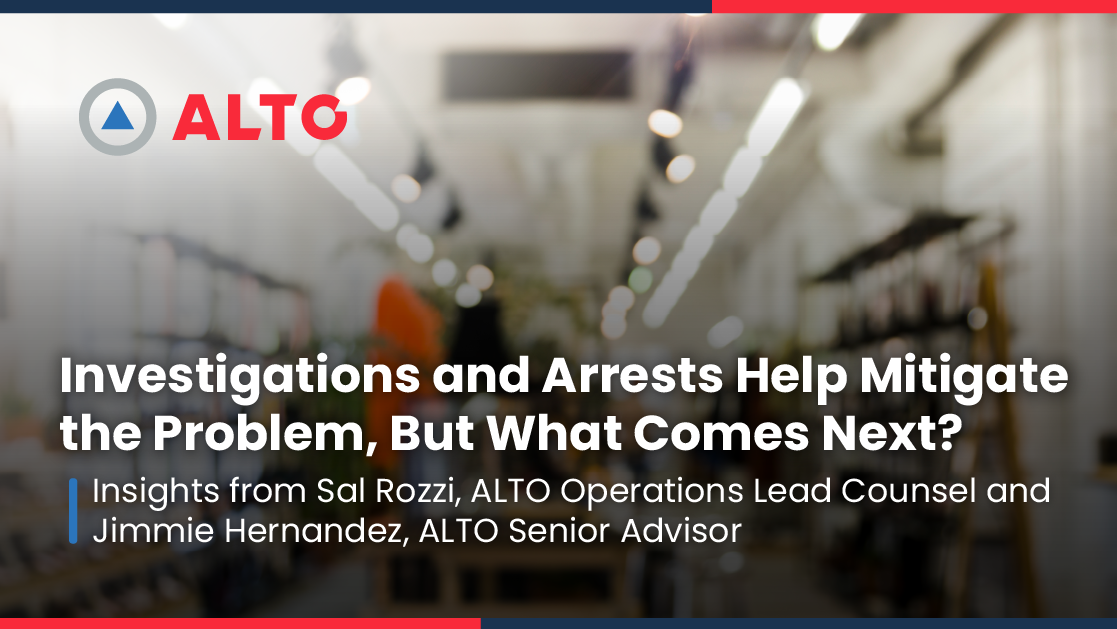Addressing retail crime involves more than apprehension; it requires building robust cases from these arrests and navigating them through the judicial system. Legal consequences are key to deter offenders from reoffending and requisite to fostering safety.
The final and pivotal stage in effectively preventing recidivism, often overlooked, is a key focus for ALTO. Retailers are at risk of offenders returning, perpetuating a dangerous cycle compromising the safety of shopping and working environments.
To explore the complex pitfalls of the post-apprehension process and how ALTO addresses them, we consulted two in-house experts: Sal Rozzi, ALTO’s Operations Lead Counsel and retired New Jersey prosecutor, and Jimmie Hernandez, ALTO’s Senior Advisor and retired NYPD Lieutenant.
Retail crime and navigating jurisdictional nuances
The challenges in advancing retail crime cases through the legal system vary significantly between jurisdictions. ALTO Operations Lead Counsel Sal Rozzi, with 25 years of prosecutorial experience, emphasizes the significance of local expertise to navigate these challenges.
“Jurisdictions differ in many ways. This is a crucial aspect of ALTO: understanding the system in each location and adapting to its nuances to work efficiently. The knowledge and experience of our legal experts is key to our success.”
Jimmie Hernandez, retired NYPD Lieutenant, adds that the COVID-19 pandemic’s impact on budgets at all levels affected the manpower available to combat retail crime. District and State Attorney offices often prioritize more serious cases over misdemeanors.
One way ALTO’s legal teams use to address these technicalities is through case aggregation.
“If we combine several misdemeanor cases into a felony level case, we have a better chance of ensuring it isn’t dismissed,” says Hernandez. “By highlighting the impact of these offenders who target multiple times at multiple locations, we expose their real effect on the community. “
Addressing resource constraints through incident and case management
ALTO plays a key role in evidence collection for case building, a task often neglected by retailers or law enforcement due to resource limitations. Many of these gaps exist due to bandwidth constraints and budget limits.
“A police officer is unlikely to spend hours at a store sifting through video footage of a shoplifting incident, especially in larger cities with numerous other priorities,” Rozzi says. “This is where ALTO’s teams step in, offering essential resources from the outset. I can personally contact legal entities. I can attend multiple court hearings in one morning, and I can personally request stay-away orders to protect stores.”
ALTO’s role in post-arrest case management includes evidence collection, court advocacy and witness preparation. Across our nationwide markets, ALTO’s legal experts regularly appear in court to ensure cases progress and aren’t addressed and not dismissed due to procedural gaps, like the absence of store representatives in court.
“When handling retail crimes as a prosecutor, it was almost certain that no one from the stores would show up.The courts need victims present in order to move forward,” Rozzi explains. “During my career, I rarely encountered victim advocates for retail crime, and few times did someone from the store come forward. Jurisdictions often use the volume of cases as an excuse to dismiss.”
Rozzi considers the potential impact ALTO might have had if its resources were available to him in the past: “I wouldn’t have had to dismiss so many cases.”
The critical role of victim advocacy
Another key component of ALTO’s post-arrest process is victim advocacy. Through vital support and resources, ALTO provides stores with visibility into the legal process by building thorough cases and gathering essential evidence and witnesses.
Advocacy and support for those affected by retail crime are often overlooked in the post-apprehension process. Even when stores receive notification to appear in court, the prospect of testifying can be daunting.
“Almost everyone wants to avoid giving testimony. Having someone to guide them through the process is crucial to a favorable outcome,” says Rozzi. “Without someone to reassure them and explain the process, they would prefer to avoid confronting a defendant altogether. ALTO’s victim advocacy role is crucial in ensuring that they can come forward while knowing they are supported.”
“It’s easy for a court overwhelmed with hundreds of cases to dismiss those that appear victimless,” Hernandez adds. “However, with a dedicated victim advocate presenting a different perspective, you start to see accountability. This is the true value of a victim advocate.”
Raising morale and delivering results
Rozzi emphasizes that based on our teams’ experiences with ALTO-supported stores, their teams and managers are appreciative of ALTO’s updates on recidivist cases and initiatives like community collaboration projects.
Even an outcome as small as a stay-away order can make a huge difference, highlights Rozzi: “If no one asks a judge to impose a stay-away order, it won’t happen. And if a repeat offender isn’t explicitly ordered to stay away from store premises, what prevents them from returning?”
“Previously, they would not have received any information beyond the initial arrest,” reflects Rozzi. “Often, they tell me, ‘Thanks for letting me know.’ Stores never had this level of visibility in the courts before. They truly value the transparency and communication we provide. Our commitment to keeping retailers informed at every stage fosters strong trust within that partnership.”
“We bring those wins back to them in a personal way,” adds Hernandez. “We make sure the store knows this is due to the hard work they put in, and our partnership.”
Supported by experts like Rozzi and Hernandez, ALTO ensures retail crime cases are managed through to resolution. With its extensive network, ALTO provides stores with the essential support and resources needed to achieve tangible results.



